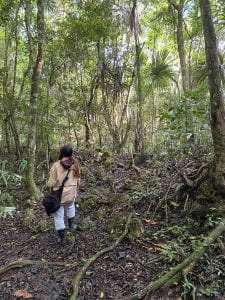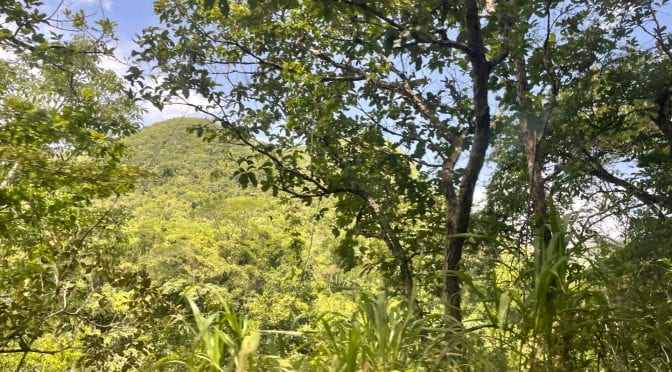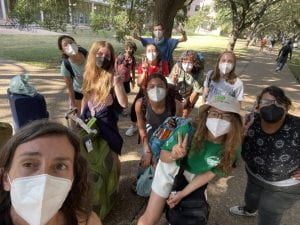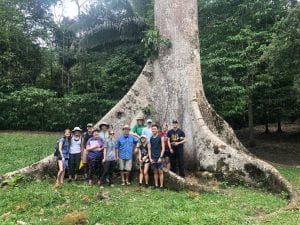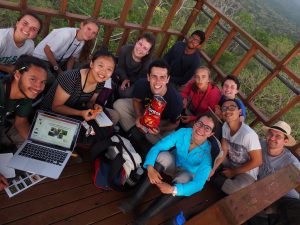Hi all, it’s Faith with some closing remarks…
Reflecting on this trip, I learned a lot about rainforests, coral reefs, and biodiversity. You may have heard the phrase that “coral reefs are the rainforests of the ocean” or the other way around, and now, I know why! I got to see first hand how both ecosystems are house so much biodiversity. Both ecosystems house a majority of the earth’s biodiversity and rely on complex interspecies relationships. They are homes to a variety of specialists, that have evolved to reduce competition with other species, and both are incredibly valuable. I observed how tree density means nothing if the tree species present aren’t native to the environment, and how hard corals provide structures and homes for an immeasurable amount of species whereas soft corals were more “space-fillers.” From the deforestation line at the Belize-Guatemalan border to the veins of coral disease at Glover’s, I saw how humans negatively impact our environments. I even learned that these two seemingly different environments are connected: long, long ago, the sea creatures with calcium carbonate skeletons laid the foundations for the rainforests soil. This lead to the forests having numerous soils types and massive cave systems beneath them. Furthermore, the rainforest is equally dependent on abiotic factors like nutrient availability, temperature, and soil (or water) type as coral reefs! In my eyes, the largest difference between these two ecosystems are the dominating species, as trees are plants and most corals are cnidarians!
The most surprising fact I learned from this trip is how nutrient deficient the reefs and rainforests are. This seems contradictory because organisms need nutrients to live, and these two ecosystems house most of the words biodiversity. So, one would assume that they were plentiful in nutrients. However, these ecosystem’s nutrient scarcity allows them to be diverse. Organisms have evolved to maximize their ability to get nutrients, and this results and mega-specific symbiotic interactions like fig wasps with fig trees and corals with dinoflagellates. These specific interactions create specialized niches that reduce competition and allow many different species to coexist!
However, this system also makes the rainforests and reefs extremely fragile. On this trip, we got to listen to Dr. Alavero, and hear his research on scarlett macaws. He emphasized that the jungles are equally impacted by climate change as coral reefs. Humans tend to overlook climate change’s effects when they aren’t directly visible, but the environments current changes have made the weather unpredictable which disrupts the life cycles of land animals and marine animals. Scarlett macaws utilize different areas when mating and foraging, and they use the weather to help determine when to mate and migrate. Similarly, corals, trees, and insects (like termites), “coordinate” their reproductive cycles around the climate. The world’s changing climate, has cause reduced reproductive success in macaws and is harming other species as well. With global warming and ocean acidification, we actively see the weakening of coral skeletons and coral bleaching. The decline of these species then causes the decline of their symbionts, and because everything is interconnected, this can cause great losses of biodiversity. Just seeing the extreme differences between the health of an mpa reef and a non-mpa reef indicates how harmful we are to our planet. I will never forget the impact we have on the planet, and I now understand how difficult it is to save intricate ecosystems. Because of their complexity, There is no “one-size-fits-all” solution to restoring these ecosystems. However, we should all do our part to be eco-friendly, and reduce our impact.
When I look back, I imagine that I’ll remember how this trip “opened my eyes” per se. When you first enter the water or forest, everything looks the same. But after you look a little more closely and learn a little about taxonomic groups, you begin to realize that the biodiversity lies not in the major differences but the minor ones. In only 2 days, I was just as excited to see a new species of grasshopper as I would have been to see a jaguar. Likewise, being able to differentiate between Diploria labyrinthiformis, Grooved brain coral, and Diploria strigosa, Symmetrical brain coral, is extremely cool. It’s hard to grasp the differences between similar species and their ecological niches without seeing them in person. Textbooks do a great job of summarizing these specific species’ interactions, yet being surrounded by them provides a true understanding about how dynamic our world is. And now, I feel like I could identify these interactions in my own community.
Here are a few other facts (that are a little less sentimental) that I’ll never forget.
- Ecosystems are entirely different at night due to temporal differentiation
- You have to be at least 5’2″ to enroll in the Belizean coast guard
- The barrier reef GREATLY protects us from wave activity (you have no idea)
- The different tree-top layers provide homes to unique animals, and some fauna will only live in specific tree species
- If you order a fish in Belize, it will be served whole!
Overall, this course was way more fun than I expected, and now I can say that I’m proud to be an Ebio major! I really enjoyed excavating the leaf-cutter ant colony, posing with the queen, exploring the Belize Zoo, and touring Caracol. Honestly, the only activity I didn’t enjoy on this trip was having to pee in a vial and sort the arthropods that fell in, but, alas, sometimes you must pee in a cup in the name of science. I learned so much, and I definitely see both the rainforest and coral reefs in a new light. I even accomplished some of my goals and one of my life goals (seeing a wild mantis shrimp), so how could I not love this trip?!
